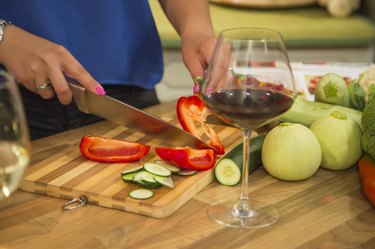
Many disease processes can cause bleeding from the gastrointestinal tract, including ulcers, medications that irritate the stomach, such as aspirin, varices, dilated blood vessels in the esophagus or stomach or cancer. Gastrointestinal bleeding occurs internally, which means it can't be seen, but the symptoms, such as vomiting blood or passing blood in the stool are visible. Gastrointestinal bleeding necessitates dietary changes, but many are temporary. There's no evidence that spicy foods cause ulcers or that bland foods prevent them, American College of Gastroenterology reports.
During Active Bleeding
Video of the Day
While you're actively bleeding, you may not take anything by mouth, either food or drink. The goal during active bleeding is to allow your GI tract to rest and heal. Putting food into the GI tract forces it to work, releasing acids in the stomach and enzymes that break down food in the intestine. You will receive nutrition through intravenous feeding until all bleeding stops, the California Pacific Medical Center explains. When all bleeding stops, you'll get a small amounts of food or drink to test for a return of symptoms before you resume a regular diet.
Video of the Day
Alcohol
Alcohol acts as an intestinal irritant. Excessive drinking also causes varices, dilated blood vessels in the esophagus and other parts of the GI tract that can rupture, causing sometimes massive hemorrhage. Your doctor may suggest that you drink no alcohol at all, especially if you drink excessively. Taking aspirin or non-steroidal anti-inflammatory drugs together may increase the risk of developing ulcers or stomach irritation, according.
Fiber
Getting an adequate amount of fiber helps keeps stools soft and moves them through the GI tract so constipation doesn't occur. Foods high in fiber include vegetables, fruits, prune juice, high-fiber cereals and whole grains. These also contain vitamins and minerals that will help your damaged tissues heal.
Iron-Rich Foods
Concentrate on healthy protein intake like fish, lean meat and poultry, which contain protein and iron to help rebuild the iron stores you may have lost during bleeding episodes. Non-heme sources of iron include beans and other legumes, vegetables such as spinach and other greens, whole grains and fortified cereals. Eating foods high in vitamin C at the same as foods high in iron increases iron absorption.
Potential Irritants
Caffeine, spicy foods and citrus can irritate your GI tract. Chocolate, tea, coffee, soda and energy or sports drinks all contain caffeine. Re-introduce potential irritants into your diet slowly, until you're sure your GI tract can handle them.
- California Pacific Medical Center; Upper Gastrointestinal (GI) Bleed: Your Care in the Hospital and at Home
- North American Society for Pediatric Gastroenterology, Hepatology, and Nutrition; A Guide to Children's Digestive and Nutritional Healt; Joseph Levy; 2001
- Drugs.com: Gastrointestinal Bleeding
- Centers for Disease Control and Prevention: Iron and Iron Deficiency